2015.1高二英语期末试题
- 格式:doc
- 大小:134.00 KB
- 文档页数:10
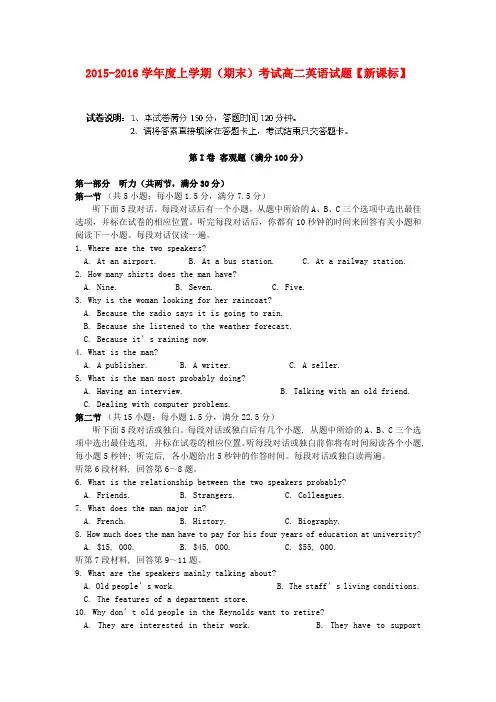
2015-2016学年度上学期(期末)考试高二英语试题【新课标】第I卷客观题(满分100分)第一部分听力(共两节,满分30分)第一节(共5小题;每小题1.5分,满分7.5分)听下面5段对话。
每段对话后有一个小题,从题中所给的A、B、C三个选项中选出最佳选项,并标在试卷的相应位置。
听完每段对话后,你都有10秒钟的时间来回答有关小题和阅读下一小题。
每段对话仅读一遍。
1. Where are the two speakers?A. At an airport.B. At a bus station.C. At a railway station.2. How many shirts does the man have?A. Nine.B. Seven.C. Five.3. Why is the woman looking for her raincoat?A. Because the radio says it is going to rain.B. Because she listened to the weather forecast.C. Because it’s raining now.4. What is the man?A. A publisher.B. A writer.C. A seller.5. What is the man most probably doing?A. Having an interview.B. Talking with an old friend.C. Dealing with computer problems.第二节(共15小题;每小题1.5分,满分22.5分)听下面5段对话或独白。
每段对话或独白后有几个小题, 从题中所给的A、B、C三个选项中选出最佳选项, 并标在试卷的相应位置。
听每段对话或独白前你将有时间阅读各个小题, 每小题5秒钟; 听完后, 各小题给出5秒钟的作答时间。
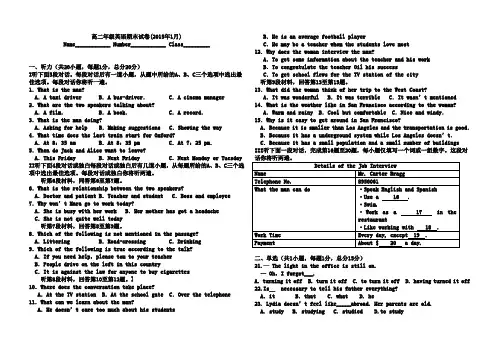
高二年级英语期末试卷(2015年1月)Name____________ Number____________ Class_________一、听力(共20小题,每题1分,总分20分)I听下面5段对话。
每段对话后有一道小题,从题中所给的A、B、C三个选项中选出最佳选项。
每段对话你将听一遍。
1.What is the man?A.A taxi driver B.A bus-driver.C.A cinema manager 2.What are the two speakers talking about?A.A film.B.A book.C.A record.3.What is the man doing?A.Asking for help B.Making suggestions C.Showing the way 4.What time does the last train start for Oxford?A.At 8:35 am B.At 8:35 pm C.At 7:25 pm.5.When do Jack and Alice want to leave?A.This Friday B.Next Friday C.Next Monday or Tuesday II听下面4段对话或独白每段对话或独白后有几道小题,从每题所给的A、B、C三个选项中选出最佳选项。
每段对话或独白你将听两遍。
听第6段材料,同答第6至第7题。
6.What is the relationship between the two speakers?A.Doctor and patient B.Teacher and student C.Boss and employee 7.Why won’t Mara go to work today?A.She is busy with her work B.Her mother has got a headacheC.She is not quite well today听第7段材料,回答第8至第9题。
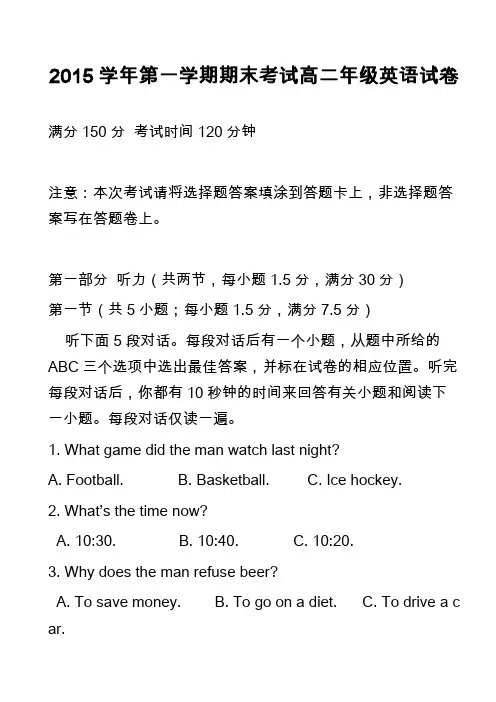
2015学年第一学期期末考试高二年级英语试卷满分150分考试时间120分钟注意:本次考试请将选择题答案填涂到答题卡上,非选择题答案写在答题卷上。
第一部分听力(共两节,每小题1.5分,满分30分)第一节(共5小题;每小题1.5分,满分7.5分)听下面5段对话。
每段对话后有一个小题,从题中所给的ABC三个选项中选出最佳答案,并标在试卷的相应位置。
听完每段对话后,你都有10秒钟的时间来回答有关小题和阅读下一小题。
每段对话仅读一遍。
1. What game did the man watch last night?A. Football.B. Basketball.C. Ice hockey.2. What’s the time now?A. 10:30.B. 10:40.C. 10:20.3. Why does the man refuse beer?A. To save money.B. To go on a diet.C. To drive a c ar.4.What’s wrong with the man?A. He caught a cold.B. He broke his warm.C. He hurt h is foot.5. What colour skirt is the woman wearing?A. Orange.B. Blue.C. Green.第二节(共15小题;每小题1.5分,满分22.5分)听下面5段对话或独白。
每段对话或独白后有几小题,从题中所给的ABC三个选项中选出最佳答案,并标在试卷的相应位置。
听完每段对话后,你将有时间阅读各小题,每小题5秒钟;听完后,各小题将给出5秒钟的作答时间。
每段对话或独白读两遍。
听第6段材料,回答第6~7 小题6. What’s the woman’s classroom number?A. A12.B. A21.C. B21.7. Where is the woman’s classroom?A. Opposite the library.B. Behind the gym.C. Beside th e gym.听第7 段材料,回答第8~9题。
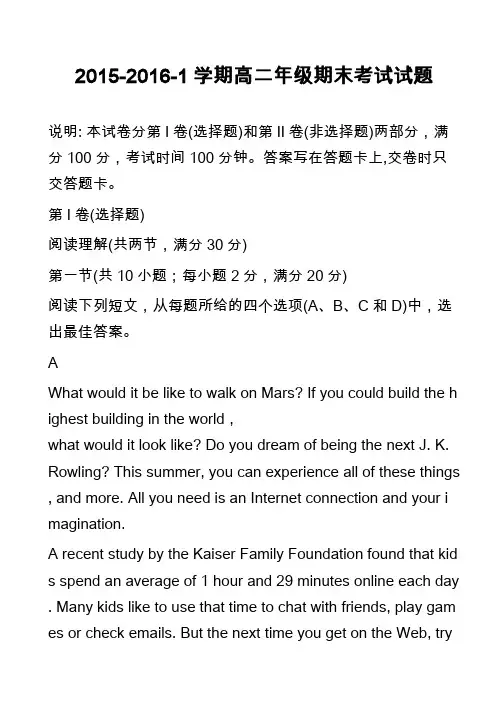
2015-2016-1学期高二年级期末考试试题说明: 本试卷分第I卷(选择题)和第II卷(非选择题)两部分,满分100分,考试时间100分钟。
答案写在答题卡上,交卷时只交答题卡。
第I卷(选择题)阅读理解(共两节,满分30分)第一节(共10小题;每小题2分,满分20分)阅读下列短文,从每题所给的四个选项(A、B、C和D)中,选出最佳答案。
AWhat would it be like to walk on Mars? If you could build the h ighest building in the world,what would it look like? Do you dream of being the next J. K. Rowling? This summer, you can experience all of these things , and more. All you need is an Internet connection and your i magination.A recent study by the Kaiser Family Foundation found that kid s spend an average of 1 hour and 29 minutes online each day . Many kids like to use that time to chat with friends, play gam es or check emails. But the next time you get on the Web, tryexploring the world instead. “With the Internet,you can go back 11,000 years in time,or go 11,000 kilometers across the planet.” said Russell, Web search expert of Google. “The whole scope of history and the world is open to you.”There is a wealth of information to be found online. For exam ple, if your family is going on vacation somewhere, do a quick online search on the area before you even get in the car. “Wh at's the background of the place; what's the history?” says R ussell. “I like to tell my kids, ‘Whenever you have a question, whenever you have a doubt, search it out.’”Ready to launch a virtual journey of your own? Here are a few starting points to get you thinking and to help you on your wa y. You can invite your parents along for the ride, too. Always a sk for permission before downloading programs and software onto your computer. And check with a parent or an adult befor e visiting any new Web site.Navigate the world in 3D with Google Earth. Begin in outer sp ace and zoom (快速移动) into the streets of any city, from Hong Kong to San Franci sco. Or visit ancient monuments, watch the changing rainfore sts over time, and dive underwater to explore tropical reef. With the Moon in Google Earth tool, you can walk in Neil Armstrong's famous footsteps. Take a guided tour of the moon's s urface with Armstrong's fellow shuttle mate astronaut Buzz Al drin.When you're exploring that part of the solar system, hop on o ver to the Red Planet with Google Mars. There, you can move very quickly around the surface and see images from the Mar s Rovers.1.The author uses questions in the first paragraph to ______ __.A.introduce the topic of the paragraphB.attract the readers' attentionC.let the readers answer itD.question the possibility of realizing the dream2.How do you travel around the world in a day according to t he passage?A.By making use of the Internet.B.By taking the time shuttle.C.By finding a tourism company in Google.D.By watching 3D films.3.Russell thought ________.A.the students shouldn't chat and play games onlineB.the students spent too much time on the InternetC.the students should learn knowledge instead of chatting o nlineD.the students could solve their problems through the line 4.What's the purpose of the passage?A.Encourage the kids to learn to use the computer. B.Encourage the kids to explore the world online. C.Encourage the kids to do some research on science. D.Encourage the kids to spend more time online.BRising levels of carbon dioxide in the atmosphere are a major cause of climate change, and now a new study has confirmed that atmospheric CO2 is also affecting the ocean chemistry a nd potentially harming sea life.Montana State University scientist Robert Dore has been rese arching the water in the Pacific Ocean for almost two decades . “We've been going to the same spot in the Pacific Ocean, an d we try and characterize longterm change in the open ocean environment. And one of the key things that we measure is C O2 levels. And we've been able to record this increasing quan tity of atmospheric CO2 into the ocean.”Scientists expected that as atmospheric CO2 increased, moreand more of the carbon dioxide would be absorbed into the o cean, affecting the chemical balance of the sea water, with a potentially harmful impact on shellfish and coral in particular.“As carbon dioxide dissolves in the water, or seawater in this case, it forms a weak acid, carbonic acid,” Dore explains. “A nd therefore, as the concentration of CO2 in the atmosphere goes up and that exchanges with the surface seawater, it driv es the PH down, and makes it more acidic.”The seawater samples Dore and his colleagues have analyze d confirm what the theory predicts.The effect was particular striking at about 250 meters down, a nd again at 500 meters. Dore and his colleagues came up wit h two possible explanations. It could be that surface water pic ked up CO2 and then moved to those depths. Or there could be a biological explanation.“It's important to realize that the oceans are really becoming a cidic. And it can have negative impacts on a whole variety of s ea life from fish to coral. It's potentially catastrophic.”5.What can be the best title of the passage?A.Climate Change Affecting SeawaterB.Oceans Becoming More AcidicC.Sea Life Facing DangerD.Scientist Researching Seawater6.With the increase of atmospheric CO2,________. A.the surface water is becoming warmerB.more corals will appear in the seaC.the PH of the ocean out here has been increasing D.the chemical balance of the seawater is affected 7.Which of the following shows the process of the impact of atmospheric CO2 on sea life?a.Sea life is endangered.b.CO2 goes into the surface water.c.The ocean chemistry is affected.d.CO2 decreases the PH and makes the seawater more aci dic.e. CO2 levels in the atmosphere go up.A.a→e→b→c→d B.e→d→c→b→aC.e→b→c→d→a D.a→b→c→d→eCThe associates I hired in my bicycle and lawn mower shop lik e myself were never perfect; however, they were excellent. W orking with them as they improved taught me new ways to sh ow forgiveness, understanding, and patience.One day the placement officer asked me to interview a young man who was having trouble finding a job. He told me that D avid was a little shy, did not talk much and was afraid to go on with interviews. He requested that I give David an interview ju st for practice. He plainly told David that I had no positions op en at the time and the interview was just for practice.When David came in for the interview, he hardly said a word. I told him what we did at the bicycle shop and showed him aro und. I told David to keep showing up because the number one thing an employer wanted in an associate was dependability. David was very quiet (he was evaluated as a slow learner in s chool). Every ten days or so, for weeks after the interview, Da vid walked into the bicycle shop and stood by the front door. He never said a word, just stood by the door.One day, shortly before Christmas, a large truck came to the shop, packed with 250 new bicycles. It had to be unloaded rig ht away or the driver would leave.It was raining. Some of my workers (without physical limitation s) chose not to brave the weather to get into work, so I was sh orthanded. It seemed everything was going wrong and on top of it, David came in the front door and just stood there. I looke d at him and shouted, “Well, all right! Fill out a time card and h elp me unload this truck!”David worked for my bicycle shop for eighteen years. He cam e to work every day thirty minutes early. He could talk; howev er, he rarely chose to. He drove my truck and made deliveries . The customers would praise David, saying, “He doesn't talk, but he really shows you how to operate a lawn mower!”8.The author gave David an interview to ________.A.give him some practiceB.show sympathy for himC.find a person who is reliableD.find a parttime worker in need9.The author finally hired David because ________.A.He realized David was dependableB.there were no other workers in the shop thenC.he needed someone who was willing to work then D.David kept showing up10.We can infer from the last paragraph that ________. A.the author prefers David to be more outgoingB.the author feels lucky to hire DavidC.David has had his character changed through work D.some customers just play jokes on David第二节(共5小题;每小题2分,满分10分)根据短文内容,从短文后的选项中选出能填入空白处的最佳选项。
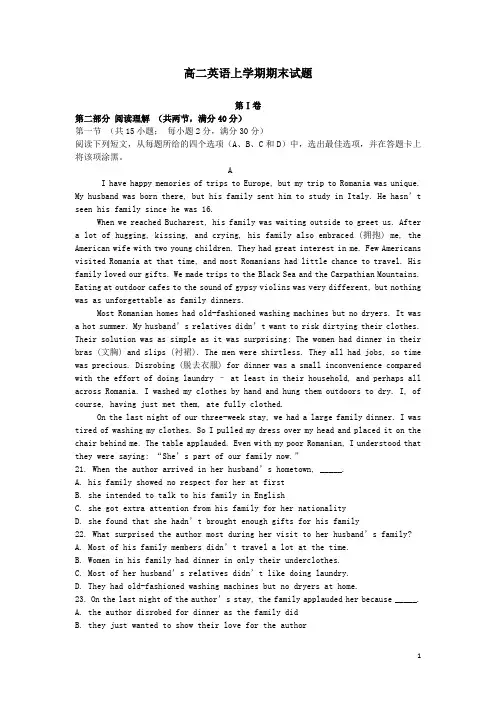
高二英语上学期期末试题第Ⅰ卷第二部分阅读理解(共两节,满分40分)第一节(共15小题;每小题2分,满分30分)阅读下列短文,从每题所给的四个选项(A、B、C和D)中,选出最佳选项,并在答题卡上将该项涂黑。
AI have happy memories of trips to Europe, but my trip to Romania was unique. My husband was born there, but his family sent him to study in Italy. He has n’t seen his family since he was 16.When we reached Bucharest, his family was waiting outside to greet us. After a lot of hugging, kissing, and crying, his family also embraced (拥抱) me, the American wife with two young children. They had great interest in me. Few Americans visited Romania at that time, and most Romanians had little chance to travel. His family loved our gifts. We made trips to the Black Sea and the Carpathian Mountains. Eating at outdoor cafes to the sound of gypsy violins was very different, but nothing was as unforgettable as family dinners.Most Romanian homes had old-fashioned washing machines but no dryers. It was a hot summer. My husband’s relatives didn’t want to risk dir tying their clothes. Their solution was as simple as it was surprising: The women had dinner in their bras (文胸) and slips (衬裙). The men were shirtless. They all had jobs, so time was precious. Disrobing (脱去衣服) for dinner was a small inconvenience compared with the effort of doing laundry – at least in their household, and perhaps all across Romania. I washed my clothes by hand and hung them outdoors to dry. I, of course, having just met them, ate fully clothed.On the last night of our three-week stay, we had a large family dinner. I was tired of washing my clothes. So I pulled my dress over my head and placed it on the chair behind me. The table applauded. Even with my poor Romanian, I understood that they were saying: “She’s part of our family now.”21. When the author arr ived in her husband’s hometown, _____.A. his family showed no respect for her at firstB. she intended to talk to his family in EnglishC. she got extra attention from his family for her nationalityD. she found that she hadn’t brought enough gifts for hi s family22. What surprised the author most during her visit to her husband’s family?A. Most of his family members didn’t travel a lot at the time.B. Women in his family had dinner in only their underclothes.C. Most of her husband’s relatives didn’t lik e doing laundry.D. They had old-fashioned washing machines but no dryers at home.23. On the last night of the author’s stay, the family applauded her because _____.A. the author disrobed for dinner as the family didB. they just wanted to show their love for the authorC. the author could finally understand them easilyD. it was time for the author to give a speechBHOW many of you have used rock, paper, scissors (RPS) as a “fair” way to settle something? If you think it is a game of chance, think again, according to scientists. RPS is a game as popular in the East as it is in the West. The rules are the same: Two players make one of the three hand signs. To decide the winner, rock breaks scissors, scissors cut paper, and paper covers rock.Many of us play with no game plan in mind. But researchers have worked out several winning patterns. The World Rock Paper Scissors Society holds tournaments (联赛) in Toronto, Canada. According to their data, players choose rock (35.4 percent) and paper (35 percent) more than scissors (29.6 percent).If your opponent is a man or an angry person, it’s quite possible they will start the game with rock, researchers have found. If your opponent is a woman or a beginner, you should expect them to start with scissors.Earlier this year, Chinese scientists asked 360 students to compete in a RPS tournament at Zhejiang University. Scientists found that winners tend to choose the same action they won with, while the loser tends to change to the next action in the order of rock, scissors, paper. This is called the “win-stay lose-change” strategy(策略). Humans use this strategy in many competitive situations.Expert RPS players have many other techniques.Monica Martinez, 2008 winner of the World RPS Tournament, said that she read faces.“I didn’t worry about what I was going to do, I just did wha t I thought they were going to do,” she told The Telegraph. If your friends are similar experts, learn from Jonathan Monaco, winner of the 2009 USA RPS Tournament. He wears dark sunglasses to cover his expressions during the game.Remember, the strategy for playing RPS depends on how skilled your opponent is. But if you’re looking for a quick, simple winning rule for a match, choose paper. Scissors is the least popular choice, and men favor rock. Both are reasons to choose paper.24. What is Paragraph 2 mainly about?A. The popularity of RPS games around the world.B. The general rules of RPS games.C. A game plan for RPS games.D. The fairness of RPS games.25. According to the article, researchers worked out some winning patterns for RPS games mainly by _______.A. studying the rules of the gameB. analyzing game dataC. interviewing expert playersD. organizing major tournaments26. Which of the following statements about Monica Martinez is TRUE according to the article?A. She likes to use the same actions many times in a row when playing the game.B. She usually follows the order of rock, scissors and paper when playing the game.C. She is good at reading her opponent’s moves when playing the game.D. She often wears dark sunglasses when playing the game.27. We can infer from the last paragraph that _______.A. scissors is the most popular choice of skilled RPS playersB. paper is a safer choice than rock and scissors for RPS playersC. beginners have barely any chance of winning against skilled RPS playersD. men are usually better at RPS games than womenCOF course, Ms Cratty wasn’t really my aunt and, out of fear, I never called her that to her face. I only called her “My Aunt Fannie (俚语)” because the name always made my father chuckle (轻声地笑) and caused my mother to look seriously at both of us – at me for being disrespectful of my elder, and at my father for encouraging my bad behavior. I enjoyed both reactions so I looked for every opportunity to work the name into as many conversations as possible.As a young woman, my mother had worked in the kitchen of a large farmhouse owned by Ms Cratty and her twin brother. Neither had married, and they had no children. My father once told me that it was because they were both too mean to share their family’s money or pass it on. Ms Cratty was famous for her jam and for never sharing the recipe with another one. Even though my mother knew the recipe , she never made the jam without Ms Cratty kitchen to direct the process and keep the secret.Each August, my mother would prepare me for Aunt Fannie’s visit. One year, after I had been particularly helpful with the jam process Aunt Fannie gave me a quarter and then made me promise that I would never spend it. “Hold onto this quarter,” she said, “and someday you will be rich. I still have my very first quarter, given to me by my grandfather.” It had obviously worked for her. So, I put the quarter in my dresser drawer, and waited to become rich.I now have the jam recipe and the quarter from Aunt Fannie. Neither has made me wealthy, but I keep them as reminders to hold onto the valuable things in life. Money can make you feel rich for a while, but it is the relationships and the memories of time spent with friends and family that truly leave you wealthy. And that is a fortune that anyone can build.28. Why did the author prefer to call Aunt Fannie “My Aunt Fannie”?A. Because she wanted to show respect for her.B. Because she believed that made her seem closer to her.C. Because she loved to see her parents’ responses to it.D. Because she didn’t like her and thus made fun of her.29. According to the second paragraph, the author’s mother _______.A. owned the large farmhouse with Aunt FannieB. disliked Aunt Fannie’s me anness and the way she would never shareC. didn’t know the exact way to make the jamD. tried to make Aunt Fannie believe that the secret recipe was safe30. The author used to believe that the quarter given to her by Aunt Fannie ______.A. was a reminder of the valuable things in her lifeB. would bring her good luck and make her richC. was a small reward for her help with the jam processD. was the exact one that Aunt Fannie had received from her grandfather31. The author thinks that we can feel wealthy if we _______.A. have a certain secret recipeB. have lasting love and friendshipC. share our wealth with othersD. have good fortune and moneyDREADY or not, the college application season has begun. There are two main kinds of early admissions programs: Early Action and Early Decision.Early Action is a great choice for the well-prepared student. Students apply early, and are allowed to apply under an Early Action program to as many colleges as they choose. The biggest advantage for students is that colleges let them know early –in most cases, before Jan 1. Roughly 15 percent of colleges and universities offer an Early Action option. Oct 15 is now the first deadline for many colleges and universities. This movement toward earlier deadlines is especially popular in the Southeast, with many of the large public universities leading the way. North Carolina State University, the University of South Carolina and the University of Georgia all have an Oct 15 Early Action deadline.Early Decision is a promise that cannot be reversed. Students who are accepted must take back their other applications and should attend that school. Students are allowed to apply to just one school under an Early Decision program. Early Decision deadlines are in early November, with colleges letting students know by mid-December. Many students believe that they are more likely to be accepted if they apply for Early Decision, but it actually depends.In some cases there is big increase in students being accepted, and at other colleges it is not that big at all. Generally, the strongest students are applying early. Athletes and students with focused interests are encouraged to apply for Early DecisionChoose the best answer:32. What is the author’s purpose in wri ting the article?A. To explain the process of applying to study in the US.B. To describe two types of US college early admissions programs.C. To encourage students who want to study in the US to apply early.D. To list the advantages of early admissions programs.33. Which of the following statements is TRUE of Early Action according to the article?A. A student who is accepted as an Early Action applicant must attend the college they apply to.B. The deadline for Early Action is usually two months earlier than the one for Early Decision.C. Students can apply to several colleges at the same time under an Early Action program.D. Students can apply for Early Action at the majority of universities and colleges in the US.34. The underlined word “reversed” in Paragraph 6 probably means _______.A. changedB. balancedC. acceptedD. arranged35. What can be concluded from the article?A. Students are not allowed to apply for both Early Decision and Early Action at the same time.B. Students applying for Early Decision impress colleges because they tend to be more active than others.C. Early Decision is most fit for students who are skilled in some field.D. Those applying for Early Decision have a better chance of being accepted than those applying for Early Action.第二节(共5小题;每小题2分,满分10分)根据短文内容,从短文后的选项中选出能填入空白处的最佳选项。
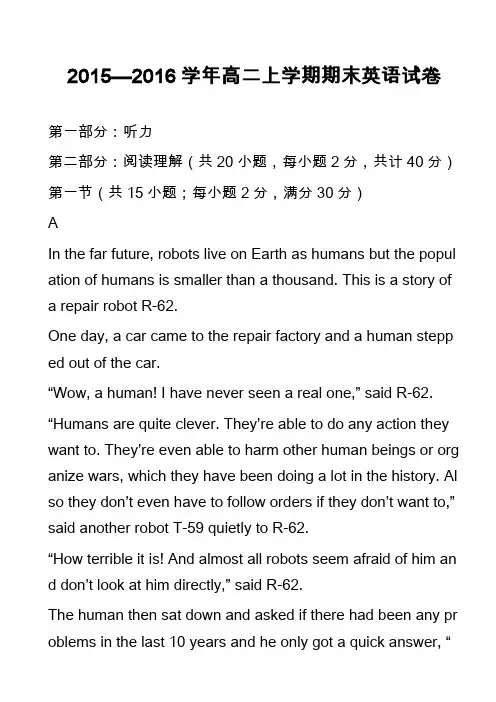
2015—2016学年高二上学期期末英语试卷第一部分:听力第二部分:阅读理解(共20小题,每小题2分,共计40分)第一节(共15小题;每小题2分,满分30分)AIn the far future, robots live on Earth as humans but the popul ation of humans is smaller than a thousand. This is a story of a repair robot R-62.One day, a car came to the repair factory and a human stepp ed out of the car.“Wow, a human! I have never seen a real one,” said R-62.“Humans are quite clever. They’re able to do any action they want to. They’re even able to harm other human beings or org anize wars, which they have been doing a lot in the history. Al so they don’t even have to follow orders if they don’t want to,”said another robot T-59 quietly to R-62.“How terrible it is! And almost all robots seem afraid of him an d don’t look at him dir ectly,” said R-62.The human then sat down and asked if there had been any pr oblems in the last 10 years and he only got a quick answer, “No, sir.”Then suddenly, R-62 said loudly, “I have one question for you.”The human said, “Yes”, a bit unhappy for not getting “sir”.“Why do human create so many robots?” asked R-62. Silence followed the question and he then said, “I don’t need t o answer questions from robots!” He then went into his car an d drove away quickly.“I really don’t understand why humans replaced (取代)themselves with robots,” asked R-62.“Because they thought that robots were more advanced(先进的) than humans. They created us to support themselves,” an swered T-59.“But there are so few humans on Earth. What they should do i s take away the robots or at least make them stop doing the w ork which humans are supposed to do,” said R-62.“I agree. But we can do nothing about it. And now we have to finish repairing this car,” said T-59.“All right, let’s continue.”21. In T-59’s opinion, humans are .A. smartB. politeC. dangerousD. stupid22. According to the text, R-62 .A. dared not look at the human directlyB. was not frien dly to the humanC. decided to give up its jobD. hope to live on Ea rth23. What can we learn from the story?A. R-62 doesn’t know what human beings look like.B. R-62 and T-59 are brothers and do different jobs.C. T-59 doesn’t want to support human beings.D. T-59 knows a lot about human beings.24. What’s R-62’s attitude towards humans’ creating robots?A. Frightened.B. Excited.C. Doubtful.D. Supporti ve.BDream-of-Jade: The Emperor’s Catby Lloyd Alexander Illustrated by D. Brent BurkettA beautiful, green-eyed, knowledgeable cat doesn’t follow the Chinese law not t o look at the emperor directly. She becomes the emperor’s fri end, teaching him how to be a wise and humorous ruler. This story is full of gentle satire(讽刺) and humor and will make an unforgettable reading advent ure(冒险) for the whole family. Lloyd Alexander’s many honors inclu de a Newbery Medal and two National Book Awards. Hardcov er(精装) .YOUR PRICE $13.95BillPennant , Babe Ruth, and Meby Timothy TocherAnyone who enjoys baseball must like this book, particularly f ans who appreciate the rich history of the game and the intere sting characters of the early 20th century teams. Hardcover. YOUR PRICE $ 15.95Boat in a Bottle KitOh, come on, you know you’ve always wondered how those model ships got through the tiny bottle neck. At last, the secre t has been revealed! A small glass bottle with a cork(软木塞), a boat, and a set of picture instructions allow you to try yo ur hand at making your own boat in a bottle. The attractive bo x provides a safe place for your completed boat in a bottle. YOUR PRICE $ 11.95Kokopelli & Company in Attack of the Smart Piesby Larry GonickFrom the cartoonist(漫画家) comes this humorous adventure about secret messages,and huge, satellite-guided(卫星导航的) smart pies. Emma has been treated badly by her stepfath er. One day she decides to run away to the Kokonino County, where the helpful Muses live. Unfortunately, Emma has arriv ed during the Great Pie War, when any careless move could r esult in getting hit by one of those has pies! In the face.Hardc over.YOUR PRICE $9.9525. Which of the following may you introduce to someone who likes sports?A. Boat in a Bottle KitB. BillPennant , Babe Ruth, and MeC. Dream-of-Jade: The Emperor’s catD. Kokopelli& Company in Attack of the Smart Pies26. Who won many honors according to the text?A. Larry GonickB. Timothy TocherC. Lloyd AlexanderD. Brent Burkett27. In the fourth book, why does Emma go to the Kokonino C ounty?A. Because she doesn’t have a happy family life.B. Because she wants to have an adventure.C. Because she wants to eat pies there.D. Because she has a friend there.CSure, it’s good to get along with your teacher because it make s the time you spend in the classroom more pleasant.And yes, it’s good to get along with your teacher because, in general, it’s smart to learn how to understand the different typ es of people you’ll meet throughout your life.“But really, there’s one super-important reason why you should get along with your teacher. When you do, learning bursts right open,” says Evelyn Vuko, a longtime teacher who writes an education column(专栏) called “Teacher Says” for the Washington Post newspaper .In fact, kids who get along with their teachers not only learn m ore, but they’re more comfortable asking questions and gettin g extra help. This makes it easier to understand new material and do your best on tests. When you have this kind of relation ship with a teacher, he or she can be someone to turn to with problems, such as problems with learning or school life, suchas bullying.As a kid in a primary or middle school, you’re at a wonderful s tage in your life. You’re like a sponge (海绵), able to absorb lots of new and exciting information. On to p of that, you’re able to think about all this information in new ways. Your teacher knows that, in most cases, is very excited to be the person who’s giving you all that material and helping you make it. Remember, teachers are people, too, and they f eel great if you’re open to what they’re teaching you. That’s w hy they wanted to be teachers in the first place—to teach! Some kids may be able to learn in any situation, whether they like the teacher or not. But most kids are sensitive to the way they get along with the teacher, and if things aren’t going well, they won’t learn as well and won’t enjoy being in class. 28.In the passage, the author mainly talks about _______.A. how to get along well with othersB. the importance of a good relation with teachersC. how much the students are expected of to get along with te achersD. how to make the time in the classroom more pleasant 29.“Learning bursts right open” in the third paragraph really means _______.A. learning becomes easier for you at onceB. you find an opening to learningC. there’ll be more problems with learningD. there’ll be no problems at all with learning3O.According to the passage, which of the following statem ents is TRUE?A. If you get on well with your teachers, you must have a goo d result in exams.B. The more questions you ask, the higher marks you will get.C. If you have a good relationship with your teacher, you can t urn to him when in trouble.D. Many kids can do well without a good relationship with teac hers.31.Which of the comments is FALSE on teachers and their work according to the passage?A. Teachers are excited even if you wouldn’t like to accept the ir teaching.B. Teachers sometimes have the same feelings as students d o.C. Though few, there are still some students who can learn ev en if they don’t like the teacher.D. Having a bad relationship with your teachers does more or less harm to your studies.DA small town in southwest Britain is banning(禁止) plastic bags in an attempt to help the environment and cut waste-a step that environmentalists believe is a first for Europe.Shopkeepers in Modbury population 1,500, agreed to sto p handing out disposable plastic bags to customers on Saturd ay. They said paper sacks and cloth carrier bags would be off ered instead.Last month, San Franciso became the first U.S. city to ba n plastic grocery bags. Internationally, laws to discourage the use of plastic bags have been passed in parts of South Africa and Ireland, where governments either tax shoppers who use them or fine companies that hand them out. Bangladesh alrea dy bans them, and so do at least 30 remote Alaskan villages. Modbury, about 225 miles southwest of London, has also declared a bag amnesty(宽限期), allowing local people to hand in plastic bags that have pil ed up at home. They will be sent for a recycling.The Modbury ban was the idea of Rebecca Hosking, who saw the effect of bags on manne life while working in the Pacific as a wildlife camerawoman. She said response(反应) in the town so far had been “really positive”.“Modbury is quite an old-fashioned town and a lot of people have wicker baskets to go out shopping anyway,” Hosking told Sky News Television. The Worldwatch Institute, an environmental research agency, states that 100 billion plastic bags are thrown away each year in the United States alone. More than 500 billion are used ye arly around the world.32. What was Rebecca Hosking?A. A lawyer.B. An environ mentalist.C. A sailor.D. A photogr apher.33.The underlined word “disposable” in the passage probably means .A. acceptableB. valuableC. throw-away D. long-lasting34 It can be inferred from the passage that .A. most of the people in Modbury continue to use plastic bagsB. fewer and fewer plastic bags will be used in the world.C. San Francisco is the first city to ban plastic bags in the worlD. most countries in the world have passed laws to ban plastic bags35. Which of the following would be the best title of the passa ge?A. Environmental ProtectionB. Big Cities Banning Plastic BagsC. Effect of Plastic Fags on Sea AnimalsD. British Town Banning Plastic Bags第二节(共5小题;每小题2分,满分10分)根据短文内容,从短文后的选项中选出能填入空白处的最佳选项。
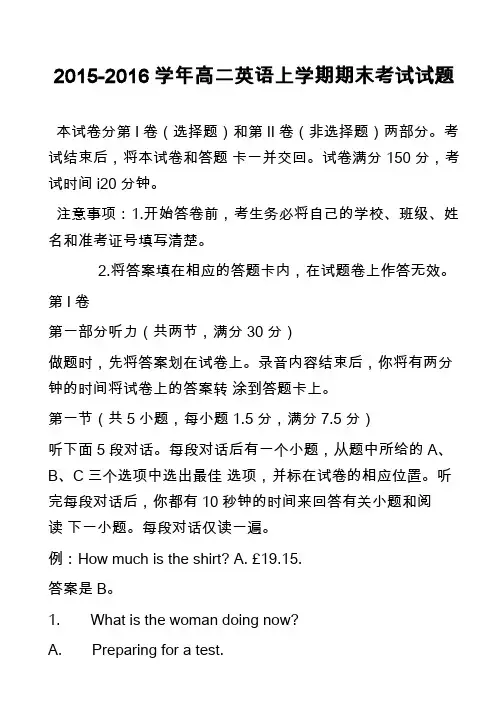
2015-2016学年高二英语上学期期末考试试题本试卷分第I卷(选择题)和第II卷(非选择题)两部分。
考试结束后,将本试卷和答题卡一并交回。
试卷满分150分,考试时间i20分钟。
注意事项:1.开始答卷前,考生务必将自己的学校、班级、姓名和准考证号填写清楚。
2.将答案填在相应的答题卡内,在试题卷上作答无效。
第I卷第一部分听力(共两节,满分30分)做题时,先将答案划在试卷上。
录音内容结束后,你将有两分钟的时间将试卷上的答案转涂到答题卡上。
第一节(共5小题,每小题1.5分,满分7.5分)听下面5段对话。
每段对话后有一个小题,从题中所给的A、B、C三个选项中选出最佳选项,并标在试卷的相应位置。
听完每段对话后,你都有10秒钟的时间来回答有关小题和阅读下一小题。
每段对话仅读一遍。
例:How much is the shirt? A. £19.15.答案是B。
1. What is the woman doing now?A. Preparing for a test.B. Playing a game.C . Watching a program.2. How did the woman reach the concert?A. By car.B. By subway.C. By bike.3. How old is Jenny now?A. 15.B. 20.C. 22.4. How does the woman feel?A. The holidays passed quickly for her.B. She’s surprised to hear what the man said.C. The man already told her about the holiday.5. What is probably the man’s job?A. He is a dancer.B. He is a manager.C. He is a salesman.第二节(共15小题;每小题1.5分,满分22.5分)听下面5段对话或独白。
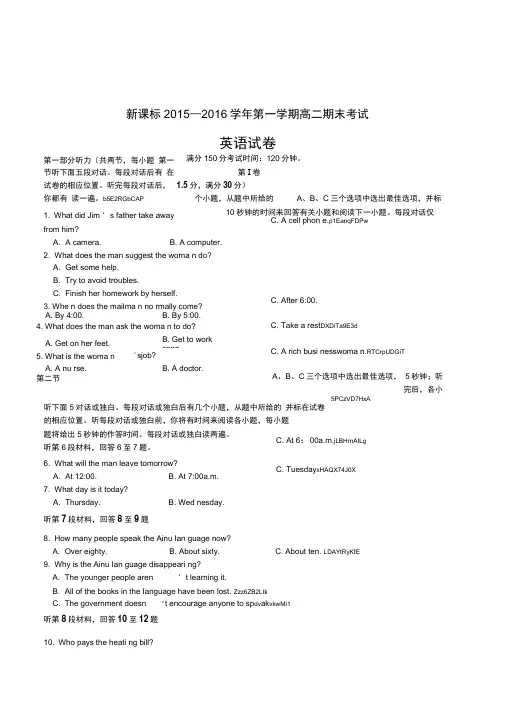
新课标2015—2016学年第一学期高二期末考试英语试卷第一部分听力(共两节,每小题 第一节听下面五段对话。
每段对话后有 在试卷的相应位置。
听完每段对话后,你都有 读一遍。
b5E2RGbCAP1. What did Jim ' s father take away from him? A. A camera. B. A computer.2. What does the man suggest the woma n do?A. Get some help.B. Try to avoid troubles.C. Finish her homework by herself.3. Whe n does the mailma n no rmally come? A. By 4:00. B. By 5:00.4. What does the man ask the woma n to do? A. Get on her feet. B. Get to work soon5. What is the woma n 'sjob?A. A nu rse.B. A doctor.第二节C. A cell phon e.p1EanqFDPwC. After 6:00.C. Take a rest DXDiTa9E3dC. A rich busi nesswoma n.RTCrpUDGiTA 、B 、C 三个选项中选出最佳选项, 5秒钟;听完后,各小题将给出5秒钟的作答时间。
每段对话或独白读两遍。
听第6段材料,回答6至7题。
6. What will the man leave tomorrow? A. At 12:00. B. At 7:00a.m. 7. What day is it today? A. Thursday.B. Wed nesday.听第7段材料,回答8至9题5PCzVD7HxAC. At 6:00a.m.jLBHrnAILgC. Tuesday xHAQX74J0X8. How many people speak the Ainu Ian guage now? A. Over eighty.B. About sixty.C. About ten. LDAYtRyKfE9. Why is the Ainu Ian guage disappeari ng?A. The younger people aren ' t learning it.B. All of the books in the Ianguage have been lost. Zzz6ZB2LtkC. The government doesn' t encourage anyone to sp dv ak vkwMi1听第8段材料,回答10至12题 10. Who pays the heati ng bill?听下面5对话或独白。
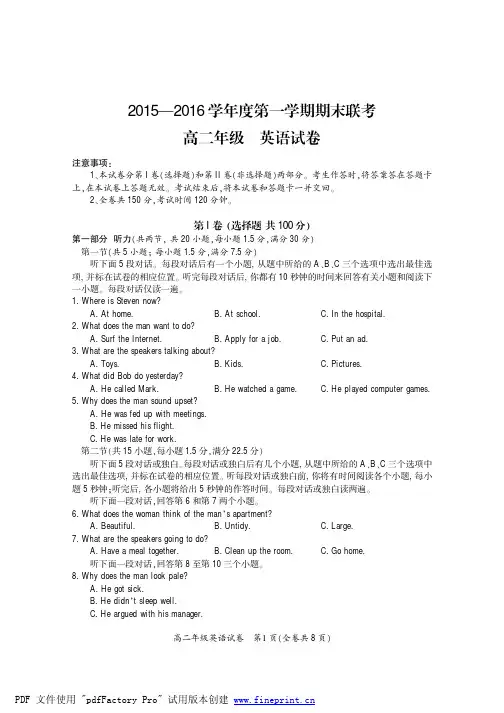
注意事项院1、本试卷分第I 卷(选择题)和第II 卷(非选择题)两部分。
考生作答时,将答案答在答题卡上,在本试卷上答题无效。
考试结束后,将本试卷和答题卡一并交回。
2、全卷共150分,考试时间120分钟。
第I 卷(选择题共100分)第一部分听力(共两节,共20小题,每小题1.5分,满分30分)第一节(共5小题;每小题1.5分,满分7.5分)听下面5段对话。
每段对话后有一个小题,从题中所给的A 、B 、C 三个选项中选出最佳选项,并标在试卷的相应位置。
听完每段对话后,你都有10秒钟的时间来回答有关小题和阅读下一小题。
每段对话仅读一遍。
1.Where is Steven now?A.At home. B.At school. C.In the hospital.2.What does the man want to do?A.Surf the Internet. B.Apply for a job. C.Put an ad.3.What are the speakers talking about?A.Toys. B.Kids. C.Pictures.4.What did Bob do yesterday?A.He called Mark. B.He watched a game. C.He played computer games.5.Why does the man sound upset?A.He was fed up with meetings.B.He missed his flight.C.He was late for work.第二节(共15小题,每小题1.5分,满分22.5分)听下面5段对话或独白。
每段对话或独白后有几个小题,从题中所给的A 、B 、C 三个选项中选出最佳选项,并标在试卷的相应位置。
听每段对话或独白前,你将有时间阅读各个小题,每小题5秒钟;听完后,各小题将给出5秒钟的作答时间。
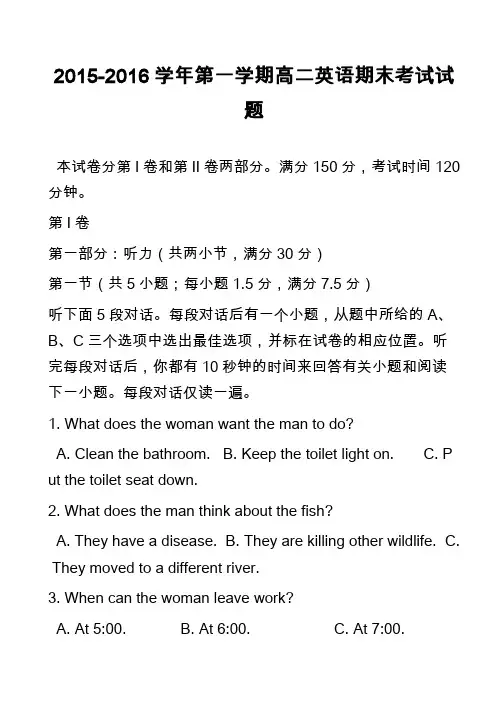
2015-2016学年第一学期高二英语期末考试试题本试卷分第I卷和第II卷两部分。
满分150分,考试时间120分钟。
第I卷第一部分:听力(共两小节,满分30分)第一节(共5小题;每小题1.5分,满分7.5分)听下面5段对话。
每段对话后有一个小题,从题中所给的A、B、C三个选项中选出最佳选项,并标在试卷的相应位置。
听完每段对话后,你都有10秒钟的时间来回答有关小题和阅读下一小题。
每段对话仅读一遍。
1. What does the woman want the man to do?A. Clean the bathroom.B. Keep the toilet light on.C. P ut the toilet seat down.2. What does the man think about the fish?A. They have a disease.B. They are killing other wildlife.C. They moved to a different river.3. When can the woman leave work?A. At 5:00.B. At 6:00.C. At 7:00.4. How many students are there in Maria’s class?A. 25.B. 35.C. 45.5. What does the man think his problem is?A. He is probably just thirsty.B. He needs to eat all the time.C. He is too tired most of the time.(共15小题;每小题1.5分,满分22.5分)听下面5段对话或独白,每段对话后有几个小题,从题中所给的A、B、C三个选项中选出最佳选项,并标在试卷的相应位置。
听每段对话前,你将有时间阅读各个小题,每小题5秒钟;听完后,各小题给出5秒钟的作答时间。
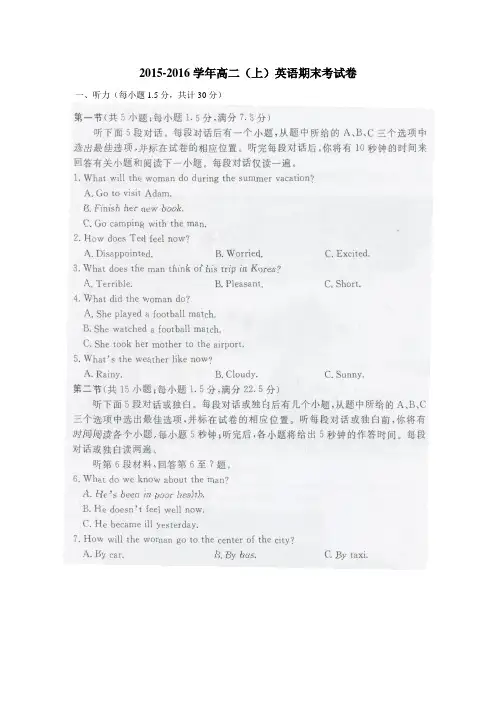
2015-2016学年高二(上)英语期末考试卷一、听力(每小题1.5分,共计30分)二、完型填空(每小题1.5分,共计30分)My friend Michelle is blind, but you’d never know it. She makes such good use of her other 21 , including her “sixth sense”, that she rarely gives the impression she’s 22 anything.Michelle looks after her children pretty much like the rest of us, 23 that she doesn’t push too hard on them, 24 really benefit a lot from her relaxed attitude. She knows when to clean the house. She moves around so fast that often 25 do n’t realize she’s blind.I 26 this the first time after my six-year-old daughter, Kayla, went to play there. When Kayla came home, she was very 27 about her day. She told me they had baked cookies, played games and done art projects. But she was 28 excited about her finger-painting project.“Mom, guess what?” said Kayla, all smiles. "I learned how to 29 colors today! Blue and red make purple, and yellow and blue make green! And Michelle 30 with us.To my great 31 , my child had learnt about color from a blind friend!Then Kayla continued, “Michelle told me my 32 showed joy, pride and a sense of accomplishment. She really 33 what I was doing!” Kayla said she had never felt how good finger paints felt 34 Michelle showed her how to paint without looking at her paper.I realized Kayla didn’t know that Michelle was blind. It had just never 35 in conversation.When I told her, she was 36 for a moment. At first, she didn’t believe me. “But Mommy, Michelle knew exactly what was i n my picture!” Kayla 37 . And I knew my child was 38 because Michelle had listened to Kayla describe her artwork. Michelle had also heard Kayla's 39 in her work. We were silent for a minute. Then Kayla said slowly, “You know, Mommy, Michelle rea lly did ‘see’ my picture. She just used my 40 .”Indeed, she uses a special type of “vision” that all mothers have.21.A. ways B. means C. methods D. senses22.A. enjoyed B. found C. missed D. lost23.A. and B. except C. even D. but24.A. who B. it C. she D. which25.A. guests B. family C. children D. friends26.A. realized B. heard C. recognized D. witnessed27.A. excited B. sad C. satisfied D. enjoyed28.A. especially B. not so C. a little D. not at all29.A. paint B. draw C. create D. mix30.A. stayed B. painted C. talked D. played31.A. excitement B. encouragement C. delight D. surprise32.A. attitude B. color C. picture D. paper33.A. touched B. distinguished C. saw D. understood34.A. after B. before C. until D. when35.A. referred to B. turned out C. come up D. talked about36.A. curious B. quiet C. puzzled D. worried37.A. cried B. insisted C. complained D. informed38.A. right B. wrong C. worried D. uncertain39.A. shortcomings B. difficulties C. pride D. description40.A. paper B. pens C. hands D. eyes三、阅读理解(每小题2分,共计40分)第一节:阅读下列短文,从每题所给的A、B、C、D四个选项中,选出最佳选项。
2014-2015高二上学期英语期末试题(附答案)江苏扬州市2014-2015学年度第一学期高二期末英语试题2015.01.本试卷分为第一卷(选择题)和第二卷(非选择题)两部分。
共120分,考试时间120分钟。
第I卷(三部分,共75分)第一部分:听力(满分15分)第一节:听下面5段对话。
每段对话后有一个小题,从题中所给的A,B,C三个选项中选出最佳选项,并标在试卷的相应位置。
听完每段对话后,你都有l0秒钟的时间来回答有关小题和阅读下一小题。
每段对话仅读一遍。
(共5小题,每题1分,满分5分) 1. How much did Richard pay for his ties? A. $40. B. $45. C. $50. 2. Where does the conversation take place?A. In a restaurant.B. At the woman’s.C. At the man’s. 3. What do we learn from the conversation? A. Something is wrong with Mary’ s ears. B. Mary doesn’t listen to him at al l. C. He forgot to tell Mary about the party. 4. What does the woman mean? A. The news is false. B. The man is telling the truth.C. The man speaker can be the manager. 5. How long did the concert last? A. 30 minutes. B. 60 minutes. C. 90 minutes.第二节:听下面5段对话或独白。
每段对话或独白后有几个小题,从题中所给的A,B,C三个选项中选出最佳选项,并标在试卷的相应位置。
2015年秋季学期期末考试高二英语第一部分:听力(满分20分)第一节(共5小题;每小题1分,满分5分)听下面5段对话。
每段对话后有一个小题,从题中所给的A、B、C三个选项中选出最佳选项,并标在试卷的相应位置。
听完每段对话后,你都有10秒钟的时间来回答有关小题和阅读下一小题。
每段对话仅读一遍。
1. Where are the two speakers?A. On a ship.B. On a train.C. On a plane.2. What will the woman do next?A. Go to her brother’s office.B. Stay for supper. C . Buy some things.3. What is the woman complaining about?A. The long wait.B. The broken computer system.C. A mistake in her bill.4. Why did Bill lose his job?A. He was in poor health.B. He made a big error.C. He often went to work late.5. What did the woman do last night?A. She attended a party.B. She did her homework.C. S he went to the cinema.第二节(共15小题;每小题1分,满分15分)听下面5段对话或独白。
每段对话或独白后有几个小题,从每题所给的A、B、C三个选项中选出最佳选项,并标在试卷的相应位置。
听每段对话或独白前,你将有时间阅读各个小题,每小题5秒钟;听完后,各小题将给出5秒钟的作答时间。
每段对话或独白读两遍。
听第6段材料,回答第6至7题。
6. Where does the woman want to go?A. To the public library.B. To the national museum.C. To the department store.7. Which bus goes by the department store?A. No.226 bus.B. No.325 bus.C. No. 105 bus.听第7段材料,回答第8至9题。
高二上学期期末考试满分120分第一节完形填空(30分)My father often works very hard. And he 16 goes to the movies. Here I'll tell you a(n) 17 story about him.One afternoon, when he finished his work, and 18 go home, he found a film ticket under the 19 on his desk. He thought he 20 to have not much work to do that day and it was quite wonderful to pass the 21 at the cinema. So he came back home and 22 finished his supper. Then he said 23 to us and left.But to our 24 , he came back about half an hour later. I asked him what was the 25 . He smiled and told us about the funny thing that had happened at the 26 .When my father was sitting in his seat, a 27 came to my father's seat and said that seat was hers. My father was 28. He took out the ticket and looked at it carefully. It was Row 17, 29 . And then he looked at the seat. It was 30 . So he asked her to show her ticket. She took out the ticket at once and the seat 31 on it was Row 17, Seat 3.Why? What's the matter with all this? While they were 32, suddenly the woman said, "The 33 of the tickets are different. " So they looked at the tickets more carefully. After a while my father said," Oh, I’m 34 ,1 made a mistake. My ticket is for the 35 a month ago. Take this seat, please. "With these words, he left.16. A. seldom B. often C. sometimes D. never17. A. bad B. strange C. funny D. interested18. A. shall B. would C. was about to D. ought to19. A. glass B. glasses C. box D. shoes20. A. liked B. planned C. took D. happened21. A. morning B. afternoon C. evening D. day22. A. surely B. quickly C. early D. suddenly23. A. sorry B. hello C. goodbye D. luck24. A. joy B. surprise C. delight D. fun25. A. matter B. thing C. film D. story26. A. cinema B. office C. theatre D. party27. A. woman B. boy C. man D. doctor28. A. interested B. disappointed C. frightened D. surprised29. A. Seat 1 B. Seat 2 C. Seat 3 D. Seat 430. A. different B. usual C. the same D. likely31. A. shown B. taken C. named D. told32. A. wondering B. wanting C. looking D. making33. A. designs B. prices C. shapes D. colors34. A. sorry B. shy C. worried D. right35. A. action B. speech C. film D. play第二节:阅读理解(共20小题;每小题2分,满分40分)AMayan cultureMore than 3,000 years ago, a people called Mayas settled in the rain forests of what is now the country of Guatemala ( 危地马拉). In the following years men went to live on the Yucatan Peninsula (尤卡坦半岛) in Mexico. They built great cities out of stone. More than 800 Mayan cities have been found in Guatemala and the Yucatan peninsula.A very outstanding (著名的) thing in Guatemala is the temples. People from all over the world come to see these fantastic (奇异的) buildings every year. At the center of each Mayan city was a very high temple. It was shaped like a pyramid with a flat top. Steep ( 陡峭的) steps were cut into the stone leading up to altar(祭坛) at the top. The temples were made of very precious materials. It shone brightly in the sunshine. Many people say that this can be compared to the religious temples of Bangkok (曼谷). The Mayan people held their religious ceremonies there every year.The Mayan people loved their temples. They were also very fine stonecutters. Theycarved many beautiful statues of their gods and their way of life. They also carvedlarge stone calendars (历法) for their temples. The calendar created by the Mayasis as accurate as the one we use today.The Mayan people learned many important things and became good astronomers. Theybecame excellent mathematicians. It was learned that they used mathematics in solvingthe building of those temples. They used maths 1,200 years before it was used in Europe.The calendar they put up on the temple is as accurate as the one we use today.The Mayan society lasted peacefully until about the year 1100. Then the Mayaswere conquered by another people from central and Southern Mexico. The temples werepartly destroyed by the invaders ( 入侵者). This was really a terrible pity. Theinvaders were the Toltec.36. Guatemala was well - known for its ______.A. environmentB. peopleC. templesD. production of agriculture37. According to the passage the underlined word means ________.A. persons who study science of the sun, moon and starsB. persons who study science of the earth's surfaceC. experts in mathsD. persons who make special study of physics38. The fine stonecutters cut many things of the following except______.A. steep stepsB. stone calendarsC. statues of their godsD. pyramids39. The calendar created by the Mayas is as accurate as the one we use today. Whatdoes the underlined word mean in the sentence?A. falseB. exactC. usefulD. good40. The best title for the above passage is " __________ ".A. The altars of the templesB. The beautiful temples of GuatemalaC. The calendarD. How were the Mayas conqueredBNot very long ago, the computer was a strange machine. Not many people understoodit. Not many people said yes to it.Today much of that is changing. The first computer system was introduced for use in business is the mid - 1950s. Since then,the number of computer systems used in business, government offices, and institutions has grown rapidly. In 1975, about 250,000 systems were in use is the United States. This figure is growing by tens of thousands every year.The computer is an important factor in our lives. Each year we use computer more and more to help us to collect data and to provide us with information. At one time people thought computers were only useful to banks, department stores and governments.But today the rapidly increasing number of computers are used for many other purposes.Have you ever stopped to think how you are affected ( 影响) by a computer? The clothes you wear were probably made with the help of a computer. The newspaper you read could have been edited and typed by a computer. Even radio programmes are often prepared by computers.Computers today are playing important roles in education,transportation and medicine. They are used to predict the weather, to examine the ocean, and to develop systems. They are being used by businesses, governments and institutions.There is no doubt that their uses will become a greater part of our lives.The influence (影响)of the computer is great. The list of its uses could go on and on. Computers now affect millions of people in countless ways every day.41. Before the 1950s the computer was _________. A. widely usedB. no use at allC. not understood by many peopleD. liked by people42. The writer thinks our lives are affected by computers, but according to the passagewe _________. A. don't quite notice itB. have known it clearlyC. don't want to know about itD. don't like it43. Although the first computer system was only introduced in the mid - 1950s, computernow affects millions of people in countless ways every day. This means the writer _________.A. doesn't like computersB. likes computersC. thinks computers have developed rapidlyD. thinks we can't live without computersCIn 1933 an unknown American called Clarence Nash went to see the filmmaker Walt Disney. He had an unusual voice and he wanted to work in Disney's cartoon film for children. When Walt Disney heard Nash's voice, he said, "Stop ! That's our duck !"The duck was the now famous Donald Duck, who first apeared in 1934 in the film.The Wise Little Hen. Donald lived in an old houseboat and worn his sailor jacket and hat. Later that year he became a star after an eight - minute Mickey Mouse film. The cinema audience liked him because he became a star after an eight - minute Mickey Mouse film. The cinema audience liked him because he was lazy and greedy, and be- cause he lost his temper very easily. And they loved his voice when he became angrywith Mickey's eight nephews. Soon Donald was more popular than Mickey Mouse himself, probably because he wasn't a goody - goody, like Mickey.In the 1930s, 1940s and 1950s, Donald and his friends Mickey, Goofy and Pluto made hundreds of Disney cartoons. He also made educational film about the place ofthe USA in the world, and safety in the home. Then in 1966 Donald Duck and his voice disappeared - there were no more new cartoons.Clarence Nash died in February, 1985. But today's children can still see the old cartoons on television and hear that famous voice.44. When did the first Donald Duck film appear?A. In 1933.B. In 1934.C. In 1966.D. In 1965.45. Who was Clarence Nash?A. A cartoonist.B. A writer.C. A filmmaker.D. The man who made the voice for Donald Duck.46. According to the passage, where do today's children see Donald Duck cartoons?A. In the dictionary.B. At the cinema.C. On the televisionD. In the theatre.47. Why did people like Donald better than Mickey Mouse?A. probably because he was lazy and greedy.B. probably because he wasn't a goody - goody, like Mickey.C. probably because he lost his temper easily.D. probably because he became angry with Mickey's eight nephews.DAmericans love pets. Many pet owners treat their pets as part of the family. Sometimes they even play interesting videos for their pets or giving them amusing toys. If they have an eye for fashion, pet owners can dress their pets in stylish clothes Sometimes they can use animal perfume (香水) to make their dogs smell well, less beastly.In America, there are more households with pets than those with children. At least 43 percent of US homes have pets of some sort. Animals, such as monkeys, snakes and even wolves find a home with some Americans. More common pets include tropical (热带的) fish, mice and birds. But the all -time favorites are cats and dogs, even at the White House. Barney,the Bushes'dog, has now become First Pet. Many stores sell tasty pet foods to owners eager to please their pets. In Houston , Texas, dogs can have their dinner delivered to their homes, just like Pizza, Pets can even go on a vacation with their owners.Furry ( 长毛皮的 ) guests at Four Seasons Hotels can enjoy meals served on fine china ( 陶器) and sleep in soft beds. Americans believe that pets have a right to be treated well. At least 75 animal welfare (兽医) can give animals medical care at a very high price. To pay for the high - tech health care, people can buy health insurance (保险) for their pets. Researchers have discovered that interacting with animals lowers a person's blood pressure. Dogs can offer protection from thieves and unwelcome visitors.Cats can help rid (使摆脱) the home of unwanted pests. Little creatures of all shapes and sizes can provide friendship and love. Pets even encourage social relationships: they give their owners an appearance of friendliness, and they provide a good topic of conversation. Pets are as basic to American culture as hot dogs or apple pies. To Americans, pets are not just animals, but a part of the family. Afterall, pets are people, too.48. _____are used by Americans to make the lives of the pets more colorful.A. Perfume and apple piesB. Regular showersC. Videos and toysD. Tasty pet foods49. Which of the following is not true according to the text?A. Americans look on their pets as part of the family.B. Four Seasons Hotels buy food for pets from China.C. A mouse may be kept as a pet in America.D. American people like to talk about pets in their spare time.50. What does " First Pet" in the 2nd paragraph refer to?A.The first pet raised by Americans.B.The most important pet in the USA.C. The most expensive pet in the USA.D. The pet raised by the president.51. The underlined word" interacting" most probably means _________.A. keeping at homeB.feedingC.helping each otherD.acting on each other52. Which of the following is the best title for this text?A. Pets in AmericaB.How to Raise PetsC.Pets-A High CostD.Animals in AmericaEDo you want to send an e - mail message to the White House?Good luck.In the past, to tell President Bush—or at least those asked to read his mail—what was on your mind, it was necessary only to sit down at a personal computer connected to the Internet and dash off a note to president @ whitehouse. gov.But this week, Tom Matzzie,an online organizer, discovered that communicating with the White House had become a bit more daunting (使人气馁的). When Mr Matzzie sent an e- mail to protest against a Bush administration policy, the message was bounced back with an automated (自动的) reply, saying he had to send it again in a new way.Under a system desplayed on the White House Web Site for the first time last week,those who want to send a message to President Bush must now go through as many asnine Web pages and fill out a detailed form that starts by asking whether the messagesender supports White House or not.The White House says the new e - mail system is an effort to be more responsive(反应迅速的) to the public and offer the government "real time "access to citizencomments.Completing a message to the president also requires choosing a subject from theprovided list, then entering a full name,organization, address and e - mail address.Once the message is sent ,the writer must wait for an automated response to the e-mail address listed, asking whether the addressee intended to send the message. Themessage is delivered to the White House only after the person using that e - mailaddress confirms (确定) it."Over all, it's a very cumbersome (迟缓的) process, "said Jokob Nielsenm.an experton Web design. "It's probably designed deliberately to cut down on the e - mail."53. We can learn that _________.A. the White House e - mail system becomes less user -friendlyB. the ideas of common people will help the government in many waysC. American citizens are welcome to send e - mail to the presidentD. the expert can solve the problem54. We learn from the text that ________.A. the new system has been used for many yearsB. to send an e - mail to the president, we need to find our way in five Web pagesC. the e - mail sender need not support the governmentD. the amount of the subjects required is very small55. Why did the White House take the measures mentioned in the text?A. To improve their image (形象) in the public eyes.B. To do something about their work.C. To reduce the e - mail.D. To have a closer tie with the citizens.第三节:语法填空(共10小题,每小题1分;满分10分)When I was a ten-year-old girl, I was once asked to deliver a speech titled “A Real Test in My Life”. To talk before the whole class! Just imagine how 1 (terrible) shy I was the moment I thought of that with so many eyes fixed upon me. I had no other 2 (choose), though. First I was to draft the speech and that was just a piece of cake for me, because I was a good writer-something to pride myself in. but the hard part 3 (lie) in my oral presentation; to read from the paper was not allowed; I had to give the speech 4 my memory and in front of such a big audience! A real trial began when I stood on the platform with my legs 5 (tremble) and my mind blank. How many time had passed by, I didn’t know. My listeners were still waiting, patiently and without any signs of rushing me. Gradually I found myself back, 6 (give) out my speech without much difficulty. Finally I finished. After 7 seemed to be a hundred years, I found my audience applauding. I made it! From then on, my fear of talking before an audience disappeared. Actually with my 8 (confident) building up, I now turn out to be a great speaker. Looking back, I know the 9 (great) difficulty on our way to success is our fear; overcome it, 10 we will be able to achieve our goals.第四节:短文改错(共10小题,每小题1分;满分10分)英语课上,老师要求同学相互修改作文。
听力理解:1-5CBACA 6-10BACCA 11-15CBCCB单项选择:16-20DBACB 21-25CABDC完型填空:26-30 DBCCD 31-35 ADBAA 36-40 BDABC阅读理解:41-45 BCCAD 46-50 CDBAC 51-55 ABDCB选词填空:56. eventually 57. In addition 58. resist 59. abandon 60. broke down阅读表达:61. Because he was part of the security team.Because he was a member of the security team.Because he joined the security team62.Because his luggage was lost.Because the airline had lost his luggage.63.Nervous.64.They were really regular and normal persons.65.Open.书面表达:66.One possible version:Dear Wang Wei,I’ve read your letter and understand your situation. Now I’d like to offer some advice.First, you should have enough sleep at night because staying up too late is bad for your health. If you have a good rest, you can learn more efficiently. Second, it doesn’t make sense to compare yourself with your classmates because every person is different from others physically and mentally. All of us have different approaches to learning. If you try the way that suits you best, you are sure to make greater progress in your lessons. More importantly, it is helpful to develop a positive attitude to life. Although we attach importance to the exams, it is equally important to improve overall qualities. Therefore, you should take regular exercise in order to keep fit.I hope my advice will help you improve your learning.Yours,Li Hua听力录音稿(高二2015.1)Text 1W: What will you do if you can't get into medical school?M: I'll study for one more year and take the test again.Text 2M: The teacher is so cruel ... I can't believe how much homework I have done!W: Yes. I didn't even sleep last night.Text 3W: Hello. Can I help you?M: Hello. I'm in Room 801. The housekeeping didn't leave any soap or clean towels. And, the floor is messy.W: Oh, sorry. I'll send someone up right away.Text 4M: Hi, do you have sweaters with other colors? This one is too dark.W: How about this one? It will look good on you.M: It's really nice. How much is it?W: $40. If you like, I can give you a 20% discount.Text 5W: Excuse me, could you tell me how to get to the nearest bank?M: Sure. Go along this road, and turn left at the first crossing. Walk along, and then you will see it on your left. It' s near the petrol station, opposite the post office.W: Is it easy to find?M: Yes. It has a big sign.Text 6M: It's a bit crowded here, isn't it?W: Yes. It' s always like this on the first night of such a big meeting. Is it your first time attending? M: Yes, it is. By the way, I'm Dan Morimoto.W: I'm Linda Green. Did you attend the opening ceremony this morning? I think the speaker is excellent.M: No, unfortunately, I was late this morning.W: What a pity! Do you plan to stay for the whole arrangement?M: No, I'm afraid I have to leave early tomorrow. Excuse me, I see a workmate of mine over there and I'd like to say hello to him.W: Sure.Text 7W: Hey, where are you going?M: I'm going to the traffic court. I've got a parking ticket. I'm going to fight it.W: How much is the fine?M:It is only $40. But it' s not the money; it' s the principle of the matter.W: Did you park illegally?M: No, I didn't. The street I live on has metered parking from 9:00 am to 6:00 pm. After 6:00 pm, you can park there with a permit. Well, I parked my car at 7:30 pm and I have a permit. But, I still got a ticket.W: Well, it sounds like you have a good case. Did you hire a lawyer?M: No. I'm going there by myself. Wish me luck.W: Good luck.Text 8I just moved to L.A. and didn't have a car. Everybody said that I couldn't get around this city without a car, but I wanted to prove that they were wrong.I asked my neighbor to take me to the downtown bus station so I could take the bus home. She thought I was crazy but gave me a ride. When I got there, I looked at the map and figured out that I needed to take three buses to get home. The fare was $2 for every ride.I waited at the bus stop for the No.8 bus. Soon it pulled up and I got on. I gave my ticket to the bus driver and took a seat. At the stop where I needed to get off, I rang the bell, the bus stopped, and I got off. I waited for the next bus. I waited and waited. A man who was also waiting for the No.14 bus said that it was always delayed. It finally came and I learned from the bus driver tha t the original No. 14 bus had broken down on the road and they had to get another bus to take its place. By that time, I was pretty tired. Maybe getting a car in L.A. isn't a bad idea.。
温州市普通高中2014学年第一学期期末教学质量检测高二英语试卷2015.1考试时间100分钟,满分100分第I卷(三部分,共70分)I.第一部分:听力(共两节,满分15分)第一节(共5小题;每小题1分,满分5分)听下面5段对话, 每段对话后有一个小题,从题中所给的A,B,C三个选项中选出最佳选项,并标在试卷的相应位置;听完每段对话后,你都有10秒钟的时间来回答有关小题和阅读下一小题。
每段对话仅读一遍。
1. How much should the man pay if he buys two bottles of milk?A.$20.B.$35.C.$40.2. How does the woman probably feel?A. Disappointed.B. Happy.C. Tired.3. Where is Kelly?A. In the restaurant.B. In her house.C. In a meeting.4. What does the man mean?A. He will train the dog later.B. He will walk the dog anyway.C. He will stay away from the dog.5. What do you know about the storm?A. It was very big.B. It killed a large animal.C. It caused a lot of damage.第二节(共10小题;每小题1分,满分10分)听下面4段对话或独白。
每段对话或独白后有几个小题,从每题所给的A,B,C三个选项中选出最佳选项,并标在试卷的相应位置。
听每段对话或独白前,你将有时间阅读各个小题,每小题5秒钟;听完后,各小题将给出5秒钟的作答时间。
每段对话或独白读两遍。
听第6段材料,回答第6至7题。
6. Why do they want to buy a gift for their mother?A. It's her birthday.B. It's Mother's Day.C. It's Women's Day.7. What are they going to buy?A. Some flowers.B. A box of chocolates.C. A book.听第7段材料,回答第8至9题。
8. What does the woman want to know?A. What the man thinks about his future.B. Where the man is going to drive.C. What kind of dreams the man has at night.9. Where does the man want to live in the future?A. In a small town.B. In a big city.C. On an island.听第8段材料,回答第10至12题。
10. How often does the man usually visit his aunt?A. Once a week.B. Twice a week.C. Every other day.11. Where does his aunt live?A. Far away from the shops.B. Near the shopping center.C. In the countryside.12. Why does his aunt have lots of pain in her leg?A. She is ill.B.She gets injured.C. She is old.听第9段材料,回答第13至15题。
13. What do the speaker and Dave have in common?A. Hobbies.B. Jobs.C. Characters.14. What do we know about Dave?A. He isn’t a good listener.B. He knows the speaker well.C. He’s never late for everything.15. When did the speaker and Dave plan to meet last weekend?A. At 4:00 p.m.B. At 5:30 p.m.C. At 6:30 p.m.II. 第二部分:英语知识运用(共两节,满分25分)第一节单项填空(共10小题,每小题1分,满分10分)从A、B、C、D四个选项中,选出可以填入空白处的最佳选项,并在答题卡上将该项涂黑。
16. He would have continued to lead _____ poor life if he hadn’t met Mr. Smith by _____ chance.A. the; /B. a; theC. a; /D. /; the17. The top students introduced three different _____ to the study of physics.A. waysB. meansC. approachesD. methods18. I regret _____ my answers carefully before turning in the paper yesterday.A. to checkB. checkingC. not to checkD. not checking19. Andy is a good husband and his wife, Alice, is clearly very _____.A. contentB. positiveC. famousD. cautious20. Mr. Burns looks rather upset, so he is ______ listen to you.A. not likely toB. likely toC. likely notD. likely to not21. The discussion today _____ three main farming problems.A. carried onB. relied onC. based onD. focused on22. Up to now, the program _____ thousands of children in those undeveloped areas.A. will saveB. has savedC. savesD. had saved23. _____, the warmer a place is, the more types of plants and animals it will usually support.A. In particularB. In generalC.In advanceD. In addition24. The scientists became inspired when they helped the people _____ to Ebola virus(病毒).A. exposeB. exposingC. exposedD. to expose25. ––I’ve been cleaning my room for hours.––_____ you look so tired.A.N o wonderB. No wayC. No doubtD. No need第二节完形填空(共15小题;每小题1分,满分15分)When I was three, my father died in an accident on the job. Then when I was seventeen, my mother 26 died. One minute she was laughing with friends; the next, she was unconscious(失去知觉的)on the floor. She never 27 . Just nineteen hours later, she was dead. I was completely at a loss. I phoned Mike Fieseler, a friend of my mother.28 he lived about an hour away, he arrived right away. As soon as he walked in, he took care of me. After the funeral(葬礼)he became a(n) 29 visitor. He made sure there was enough food and that the bills were 30 . Touchingly, one day he offered to be my guardian(监护人), 31 in his opinion would be his honor to take me in.32 the years, Mike has become not only a legal guardian but a real 33 . When I was unable to get past thoughts of my mother, he was there to 34 . When my husband and I bought our first house, he spent weekends improving it. What more 35 you want from a father than that?Twelve years after Mike stepped into my 36 , I gave birth to his first granddaughter, EmilyMichl Simonso n. Mike’s legal name is Michl. The name is a reminder of my saved 37 and a promise for the future. I hope one day Emily will see that 38 . I also want her to know this: No matter how fast the waters rise, no matter how hard 39 may be to keep her head above the waves, 40 will throw her a line.26. A. suddenly B. naturally C. bravely D. painfully27. A. gave up B. looked up C. turned up D. woke up28. A. Because B. Since C. Though D. Unless29. A. regular B. curious C. ordinary D. enthusiastic30. A. spent B. sent C. paid D. taken31. A. that B. which C. what D. who32. A. Until B.Since C. After D. Over33. A. teacher B. father C. friend D. partner34. A. comment B. defend C. listen D. argue35. A. could B. would C. should D. might36. A. memory B. heart C. career D. life37. A. child B. past C. family D. father38. A. in addition B. as well C. or so D. on purpose39. A. she B. he C. one D. it40. A. nobody B. anyone C. someone D. everyoneIII. 第三部分:阅读理解:(共两节,满分30分)第一节(共11小题,满分22分)阅读下列四篇短文,从每题所给的(A、B、C、D)四个选项中选出最佳选项。